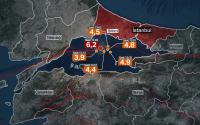15 December 2005cbc.ca
Researchers fear the North's changing environment will affect the health of Inuit by decreasing their access to country food.
A researcher working on Inuit health and climate change, Dr. Christopher Furgal, has been conducting research with 17 Inuit communities from the western Arctic to Labrador.
Furgal, who works at the Nasivvik Centre at Laval University in Quebec City, says more Inuit are turning to a southern-style diet, as society changes.
He says erratic weather in the North is speeding up that trend, as hunters face less ice and uncertain travel conditions on land.
"They're finding it harder to get out as often as they normally would, less people are going hunting as frequently as they normally would, therefore decreasing the amount of hunting that they're doing," he says. "So there's a concern there's less country food circulating within the community."
Furgal says the early breakup in the spring is especially a concern since it reduces access to seals on the ice.
"The change related to diet is taking out some of the good things of the diet," he says. "We know that for example, seal and marine mammal fat contributes a lot of Omega 3 fatty acids to the Inuit diet which protects people, to a certain degree, against some cardiovascular or heart diseases."
NASIVVIK: Centre for Inuit Health and Changing EnvironmentsInuit leaders back up Furgal's observations. Makivik president Pita Aatami says the climate is changing so much in Nunavik, polar bears are showing up in places they've never been seen before.
"Later winters, early springs, very unpredictable summers, a lot of high winds. In some of our communities, I'm hearing that there's one storm after another, just like that," says Aatami, whose group represents Inuit in northern Quebec.
Furgal says in the next year, his group hopes to begin a pilot project in Nunavik.
They'll try to determine just how much Inuit are turning to grocery stores to replace food such as seals and other marine mammals they traditionally eat.






